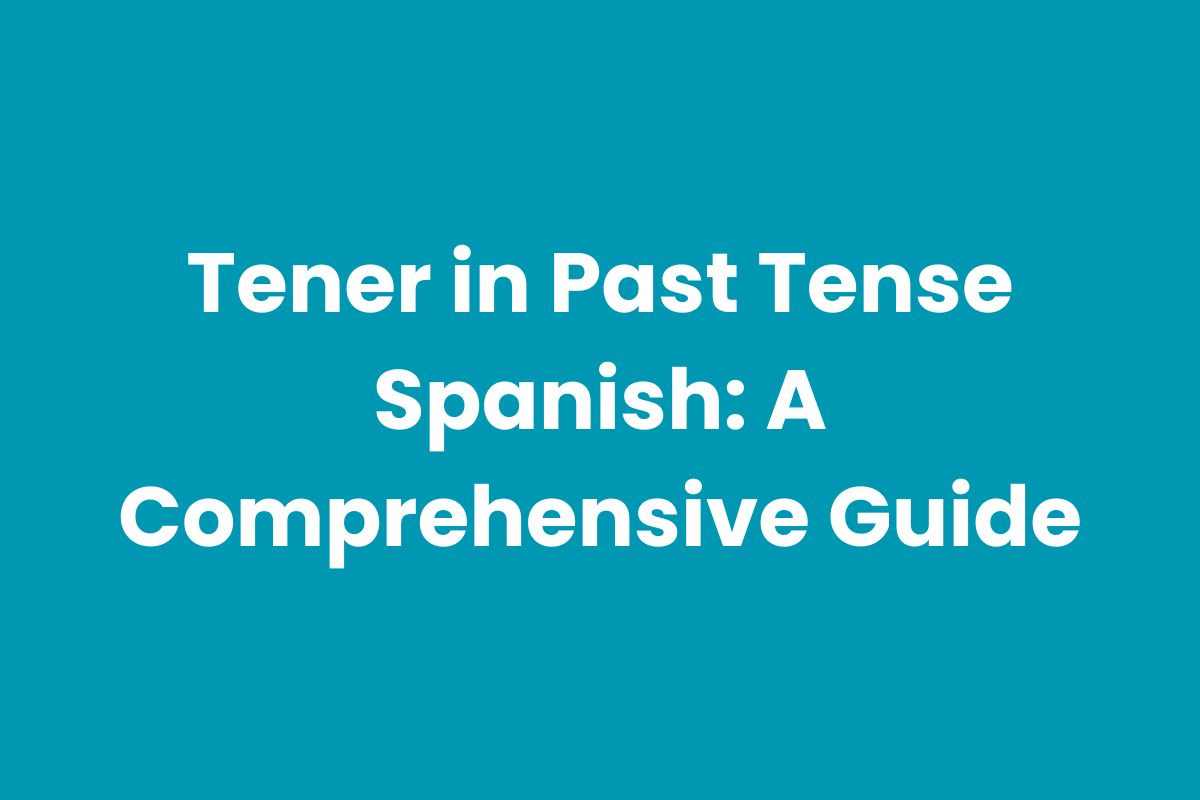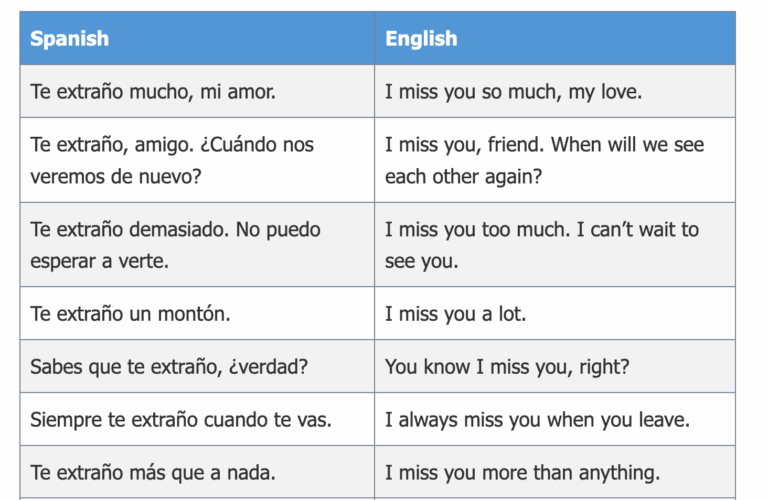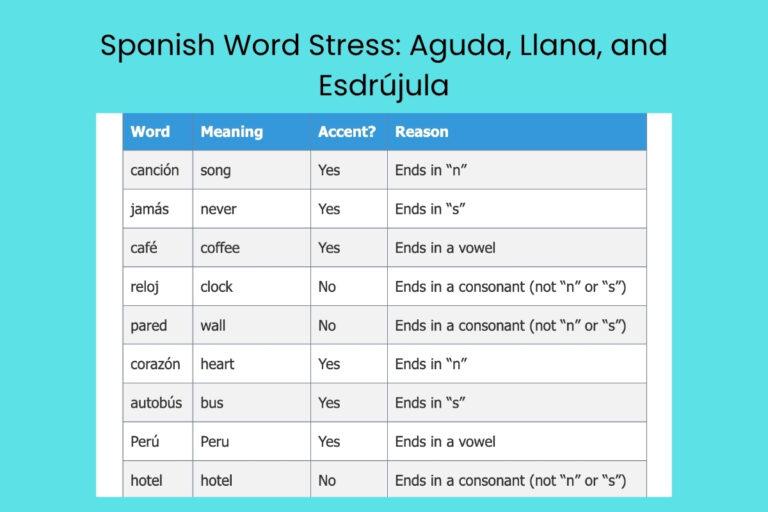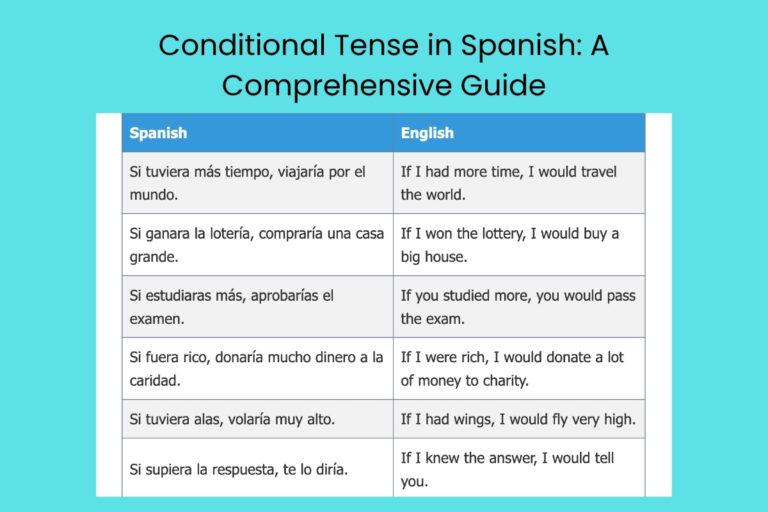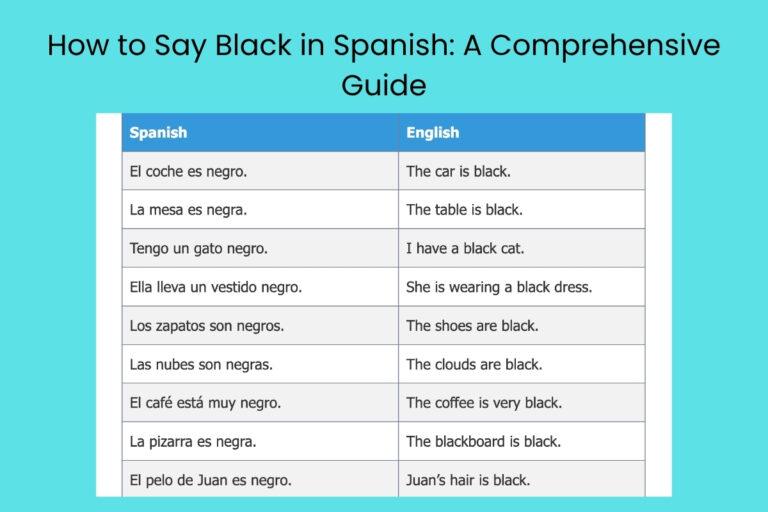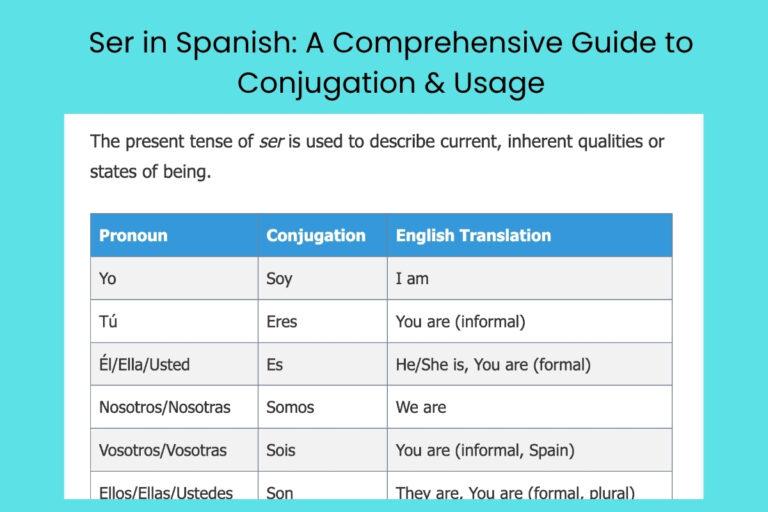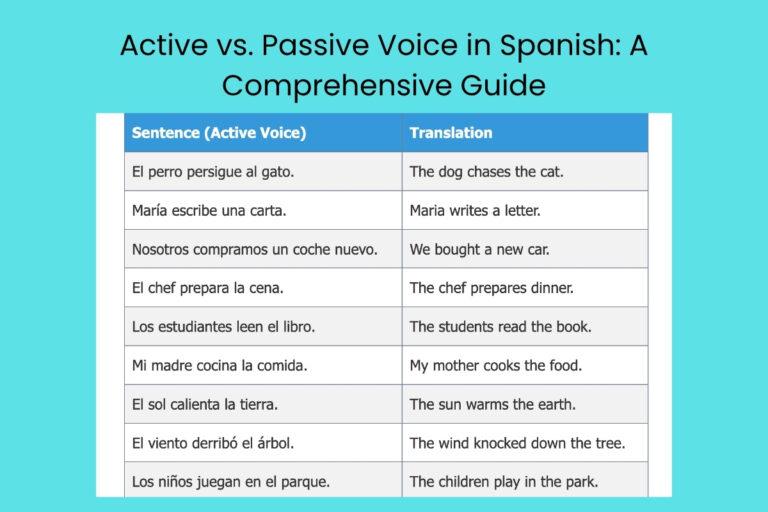Tener in Past Tense Spanish: A Comprehensive Guide
Understanding how to use the verb *tener* (to have) in past tenses is crucial for expressing past states, possessions, and obligations in Spanish. This guide provides a comprehensive overview of *tener* in the preterite, imperfect, and other past forms.
Mastering these tenses allows for more nuanced and accurate communication about past events and experiences. This article is perfect for Spanish learners of all levels, from beginners to advanced students looking to solidify their understanding of Spanish verb conjugations and usage.
Table of Contents
- Introduction
- Definition of *Tener* and Its Past Tenses
- Structural Breakdown of *Tener* in Past Tenses
- Types and Categories of Past Tense *Tener* Usage
- Examples of *Tener* in Past Tenses
- Usage Rules for *Tener* in Past Tenses
- Common Mistakes When Using *Tener* in Past Tenses
- Practice Exercises
- Advanced Topics
- Frequently Asked Questions (FAQ)
- Conclusion
Introduction
The verb *tener*, meaning “to have,” is one of the most fundamental and frequently used verbs in the Spanish language. Its versatility extends to expressing possession, age, obligation, and various other states.
Mastering the past tenses of *tener* is essential for narrating past events, describing past conditions, and conveying historical information accurately. Without a firm grasp of these tenses, your ability to communicate effectively about the past will be severely limited.
This comprehensive guide will delve into the intricacies of *tener* in the past tenses, including the preterite, imperfect, past perfect, conditional perfect, and past subjunctive. We will explore each tense’s conjugation, usage rules, and common pitfalls.
Through detailed explanations, numerous examples, and practical exercises, this guide aims to equip you with the knowledge and skills necessary to confidently and accurately use *tener* in any past context. Whether you are a beginner just starting your Spanish journey or an advanced learner seeking to refine your grammar skills, this article will provide valuable insights and practical tools to enhance your understanding of Spanish grammar.
Definition of *Tener* and Its Past Tenses
*Tener* is a Spanish verb that primarily means “to have.” However, its usage extends beyond simple possession. It can also indicate age, obligation, and various other states.
Understanding how *tener* functions in different contexts is crucial for mastering its past tense forms.
In the past tenses, *tener* describes states, possessions, or obligations that existed at some point in the past. The specific tense used depends on the nature of the past action or state and the speaker’s perspective.
Classification: *Tener* is an irregular verb, meaning its conjugation does not follow the standard patterns of regular Spanish verbs. Its irregularity is particularly evident in the preterite tense.
Function: The function of *tener* in the past is to convey information about what someone possessed, felt, or was obligated to do at a specific time or over a period in the past. This includes physical possessions, emotional states, age, and duties.
Contexts: *Tener* in the past tenses is used in a wide range of contexts, including:
- Narrating stories about past events
- Describing past habits or routines
- Expressing past obligations or necessities
- Talking about someone’s age in the past
- Describing past emotional or physical states
Structural Breakdown of *Tener* in Past Tenses
The structural breakdown of *tener* in past tenses involves understanding the conjugation patterns for each tense. Here’s a look at the preterite, imperfect, and other past tenses of *tener*.
Preterite Conjugation
The preterite tense is used to describe completed actions in the past. The preterite conjugation of *tener* is irregular:
| Pronoun | Preterite Conjugation |
|---|---|
| Yo | tuve |
| Tú | tuviste |
| Él/Ella/Usted | tuvo |
| Nosotros | tuvimos |
| Vosotros | tuvisteis |
| Ellos/Ellas/Ustedes | tuvieron |
For example, “Yo tuve un coche nuevo” (I had a new car).
Imperfect Conjugation
The imperfect tense is used to describe ongoing actions, habits, or states in the past. The imperfect conjugation of *tener* is regular:
| Pronoun | Imperfect Conjugation |
|---|---|
| Yo | tenía |
| Tú | tenías |
| Él/Ella/Usted | tenía |
| Nosotros | teníamos |
| Vosotros | teníais |
| Ellos/Ellas/Ustedes | tenían |
For example, “Yo tenía diez años” (I was ten years old).
Other Past Tenses
Besides the preterite and imperfect, *tener* can also be used in other past tenses, such as the past perfect (pluscuamperfecto), conditional perfect, and past subjunctive forms.
- Past Perfect (Pluscuamperfecto): Formed with the imperfect of *haber* + past participle of *tener* (tenido). Example: “Ya había tenido esa experiencia” (I had already had that experience).
- Conditional Perfect: Formed with the conditional of *haber* + past participle of *tener* (tenido). Example: “Habría tenido más éxito si…” (I would have had more success if…).
- Past Subjunctive: Has two forms, both using the stem *tuv-* derived from the preterite. Example: “Quería que tuvieras más oportunidades” (I wanted you to have more opportunities).
Types and Categories of Past Tense *Tener* Usage
The verb *tener* is versatile and can be used in various contexts in the past tense. Here are some common categories of its usage:
Possession in the Past
*Tener* is used to indicate that someone possessed something in the past. This can be a tangible object, a quality, or a relationship.
Example: “Ella tuvo un perro cuando era niña” (She had a dog when she was a child).
Age in the Past
*Tener* is used to express someone’s age in the past. Unlike English, Spanish uses *tener* instead of “to be” to indicate age.
Example: “Yo tenía veinte años en 2010” (I was twenty years old in 2010).
Obligation in the Past
*Tener que* + infinitive is used to express an obligation or necessity in the past.
Example: “Tuve que estudiar mucho para el examen” (I had to study a lot for the exam).
Experiences in the Past
*Tener* can describe past experiences or feelings.
Example: “Tuve miedo durante la tormenta” (I was scared during the storm).
States in the Past
*Tener* can describe states or conditions that existed in the past.
Example: “Tenía frío anoche” (I was cold last night).
Examples of *Tener* in Past Tenses
Here are some examples of *tener* used in different past tenses, categorized for clarity.
Preterite Examples
The preterite tense is used for completed actions in the past. The following table provides examples of *tener* in the preterite tense.
| Sentence | Translation |
|---|---|
| Yo tuve un problema con mi coche ayer. | I had a problem with my car yesterday. |
| Tú tuviste una fiesta de cumpleaños el año pasado. | You had a birthday party last year. |
| Él tuvo una entrevista de trabajo la semana pasada. | He had a job interview last week. |
| Ella tuvo una buena idea durante la reunión. | She had a good idea during the meeting. |
| Nosotros tuvimos mucho trabajo que hacer. | We had a lot of work to do. |
| Vosotros tuvisteis la oportunidad de viajar. | You (plural, informal) had the opportunity to travel. |
| Ellos tuvieron una casa grande en el campo. | They had a big house in the countryside. |
| Usted tuvo una cita con el médico. | You (formal) had an appointment with the doctor. |
| Yo tuve que estudiar para el examen final. | I had to study for the final exam. |
| Tú tuviste que trabajar hasta tarde. | You had to work late. |
| Él tuvo que ayudar a su padre. | He had to help his father. |
| Ella tuvo que limpiar la casa. | She had to clean the house. |
| Nosotros tuvimos que cancelar el viaje. | We had to cancel the trip. |
| Vosotros tuvisteis que esperar mucho tiempo. | You (plural, informal) had to wait a long time. |
| Ellos tuvieron que tomar una decisión difícil. | They had to make a difficult decision. |
| Usted tuvo que llenar muchos papeles. | You (formal) had to fill out many papers. |
| Yo tuve que ir al supermercado. | I had to go to the supermarket. |
| Tú tuviste suerte con el clima. | You were lucky with the weather. |
| Él tuvo éxito en su carrera. | He was successful in his career. |
| Ella tuvo una experiencia increíble. | She had an incredible experience. |
Imperfect Examples
The imperfect tense is used for ongoing or habitual actions in the past. The following table provides examples of *tener* in the imperfect tense.
| Sentence | Translation |
|---|---|
| Yo tenía diez años cuando me mudé aquí. | I was ten years old when I moved here. |
| Tú tenías el pelo largo cuando éramos jóvenes. | You had long hair when we were young. |
| Él tenía muchos amigos en la escuela. | He had many friends at school. |
| Ella tenía una casa en la playa. | She had a house on the beach. |
| Nosotros teníamos la costumbre de ir al cine todos los viernes. | We used to go to the movies every Friday. |
| Vosotros teníais mucha energía cuando erais niños. | You (plural, informal) had a lot of energy when you were children. |
| Ellos tenían un jardín grande con muchos árboles. | They had a big garden with many trees. |
| Usted tenía una oficina en el centro de la ciudad. | You (formal) had an office in the city center. |
| Yo tenía que levantarme temprano para ir al trabajo. | I had to get up early to go to work. |
| Tú tenías que cuidar a tus hermanos menores. | You had to take care of your younger siblings. |
| Él tenía que estudiar mucho para sacar buenas notas. | He had to study a lot to get good grades. |
| Ella tenía que ayudar en casa después de la escuela. | She had to help at home after school. |
| Nosotros teníamos que hacer la tarea juntos. | We had to do homework together. |
| Vosotros teníais que caminar mucho para llegar a la escuela. | You (plural, informal) had to walk a lot to get to school. |
| Ellos tenían que trabajar los fines de semana. | They had to work on weekends. |
| Usted tenía que viajar mucho por su trabajo. | You (formal) had to travel a lot for your work. |
| Yo tenía miedo de la oscuridad cuando era niño. | I was afraid of the dark when I was a child. |
| Tú tenías frío en invierno. | You were cold in winter. |
| Él tenía hambre después de jugar al fútbol. | He was hungry after playing football. |
| Ella tenía sed después de correr. | She was thirsty after running. |
Past Perfect Examples
The past perfect (pluperfect) tense describes an action completed before another action in the past. It’s formed using the imperfect form of *haber* (to have) plus the past participle of *tener* (tenido).
| Sentence | Translation |
|---|---|
| Cuando llegué, ya había tenido mi café. | When I arrived, I had already had my coffee. |
| Antes de irme de viaje, ya había tenido todas las vacunas. | Before leaving on my trip, I had already had all the vaccinations. |
| Ella ya había tenido esa experiencia antes de conocerme. | She had already had that experience before meeting me. |
| Nosotros ya habíamos tenido la cena cuando llegaron los invitados. | We had already had dinner when the guests arrived. |
| Él no había tenido la oportunidad de hablar antes de que terminara la reunión. | He hadn’t had the chance to speak before the meeting ended. |
| Yo no había tenido un coche hasta que cumplí treinta años. | I hadn’t had a car until I turned thirty. |
| Tú ya habías tenido ese libro cuando te lo pedí. | You had already had that book when I asked you for it. |
| Antes de empezar el curso, ya había tenido algunos conocimientos básicos. | Before starting the course, I had already had some basic knowledge. |
| Cuando llegué al concierto, ya había tenido lugar la primera canción. | When I arrived at the concert, the first song had already taken place. |
| Ella había tenido muchos problemas antes de encontrar una solución. | She had had many problems before finding a solution. |
| Nosotros habíamos tenido muchas oportunidades antes de esta. | We had had many opportunities before this one. |
| Cuando me desperté, ya había tenido un sueño extraño. | When I woke up, I had already had a strange dream. |
| Antes de que terminara el año, él ya había tenido dos trabajos diferentes. | Before the year ended, he had already had two different jobs. |
| Yo ya había tenido suficiente cuando decidí marcharme. | I had already had enough when I decided to leave. |
| Antes de que lo supiera, ella ya había tenido una sorpresa para mí. | Before I knew it, she had already had a surprise for me. |
| Él ya había tenido la respuesta antes de que yo preguntara. | He had already had the answer before I asked. |
| Antes de que lo entendiera, ya había tenido una visión clara de la situación. | Before I understood it, I had already had a clear vision of the situation. |
| Cuando llegamos al restaurante, ya habíamos tenido mucha hambre. | When we arrived at the restaurant, we had already been very hungry. |
| Antes de que me diera cuenta, ya había tenido un impacto significativo en mi vida. | Before I realized it, it had already had a significant impact on my life. |
| Ella ya había tenido muchos logros antes de cumplir los treinta. | She had already had many achievements before turning thirty. |
Conditional Perfect Examples
The conditional perfect tense expresses what someone would have had or would have done, often in hypothetical situations. It uses the conditional form of *haber* plus the past participle of *tener*.
| Sentence | Translation |
|---|---|
| Habría tenido éxito si hubiera estudiado más. | I would have had success if I had studied more. |
| Si hubiera ahorrado dinero, habría tenido la oportunidad de viajar. | If I had saved money, I would have had the opportunity to travel. |
| Ella habría tenido una mejor vida si hubiera tomado otras decisiones. | She would have had a better life if she had made other decisions. |
| Habríamos tenido más tiempo si hubiéramos salido antes. | We would have had more time if we had left earlier. |
| Si hubiera sabido, habría tenido más cuidado. | If I had known, I would have had more caution. |
| Yo habría tenido un perro si mi apartamento lo permitiera. | I would have had a dog if my apartment allowed it. |
| Tú habrías tenido una mejor nota si hubieras revisado tus respuestas. | You would have had a better grade if you had checked your answers. |
| Si hubiera tenido más experiencia, habría tenido el trabajo. | If I had had more experience, I would have had the job. |
| Habría tenido más amigos si fuera más extrovertido. | I would have had more friends if I were more outgoing. |
| Ella habría tenido menos estrés si hubiera planificado mejor. | She would have had less stress if she had planned better. |
| Habríamos tenido una mejor vista si hubiéramos llegado antes. | We would have had a better view if we had arrived earlier. |
| Si hubiera tenido más información, habría tenido una mejor decisión. | If I had had more information, I would have had a better decision. |
| Habría tenido más confianza si hubiera practicado más. | I would have had more confidence if I had practiced more. |
| Yo habría tenido la oportunidad de conocerla si no hubiera llegado tarde. | I would have had the opportunity to meet her if I hadn’t arrived late. |
| Antes de la pandemia, habría tenido la oportunidad de viajar mucho más. | Before the pandemic, I would have had the opportunity to travel much more. |
| Él habría tenido un coche nuevo si hubiera ahorrado más dinero. | He would have had a new car if he had saved more money. |
| Si hubiera estudiado en el extranjero, habría tenido una experiencia cultural increíble. | If I had studied abroad, I would have had an incredible cultural experience. |
| Habríamos tenido una fiesta más grande si hubiéramos tenido más espacio. | We would have had a bigger party if we had had more space. |
| Antes de que se mudaran, habrían tenido la oportunidad de construir una casa. | Before they moved, they would have had the opportunity to build a house. |
| Si hubiera tenido más tiempo, habría tenido la oportunidad de aprender un nuevo idioma. | If I had had more time, I would have had the opportunity to learn a new language. |
Past Subjunctive Examples
The past subjunctive is used in subordinate clauses to express doubt, desire, or uncertainty about past actions. There are two forms, but here we will focus on the more commonly used form derived from the preterite stem.
| Sentence | Translation |
|---|---|
| Quería que tuvieras una buena experiencia. | I wanted you to have a good experience. |
| Era importante que tuvieras toda la información. | It was important that you had all the information. |
| No creía que tuvieras razón. | I didn’t believe you were right. |
| Dudaba que tuvieras el dinero. | I doubted you had the money. |
| Ojalá tuvieras más tiempo. | I wish you had more time. |
| Me sorprendió que tuvieras tantos problemas. | I was surprised that you had so many problems. |
| Era necesario que tuvieras un permiso. | It was necessary that you had a permit. |
| No pensaba que tuvieras la edad suficiente. | I didn’t think you were old enough. |
| Esperaba que tuvieras una respuesta. | I hoped you had an answer. |
| Sentía que tuvieras que irte. | I was sorry that you had to leave. |
| Me alegraba que tuvieras éxito. | I was happy that you had success. |
| Era raro que tuvieras tanto interés. | It was strange that you had so much interest. |
| No estaba seguro de que tuvieras la capacidad. | I wasn’t sure you had the ability. |
| Temía que tuvieras un accidente. | I feared you had an accident. |
| No imaginaba que tuvieras tantos seguidores. | I couldn’t imagine you had so many followers. |
| Fue increíble que tuvieras la oportunidad. | It was incredible that you had the opportunity. |
| No era posible que tuvieras todo. | It wasn’t possible that you had everything. |
| Era evidente que tuvieras un talento. | It was evident that you had a talent. |
| Necesitaba que tuvieras confianza. | I needed you to have confidence. |
| No me importaba que tuvieras una opinión diferente. | I didn’t care that you had a different opinion. |
Usage Rules for *Tener* in Past Tenses
Understanding the specific usage rules for each past tense is crucial for accurate communication.
Preterite Usage
Use the preterite tense to describe completed actions that occurred at a specific point in the past. It focuses on the beginning and end of the action.
Example: “Tuve una reunión importante ayer” (I had an important meeting yesterday).
Imperfect Usage Rules
Use the imperfect tense to describe ongoing or habitual actions, states, or conditions in the past. It emphasizes the duration or repetition of the action.
Example: “Tenía mucho trabajo todos los días” (I had a lot of work every day).
Past Perfect Usage
Use the past perfect tense to indicate an action that was completed before another action in the past. It helps establish a sequence of events.
Example: “Cuando llegué a casa, ya había tenido la cena” (When I arrived home, I had already had dinner).
Conditional Perfect Usage
Use the conditional perfect tense to express what would have happened if a certain condition had been met in the past. It often appears in hypothetical situations.
Example: “Habría tenido más éxito si hubiera estudiado más” (I would have had more success if I had studied more).
Past Subjunctive Usage
The past subjunctive is used in dependent clauses to express doubt, desire, or uncertainty about past actions. It often follows verbs of emotion, doubt, or desire.
Example: “Quería que tuvieras una buena oportunidad” (I wanted you to have a good opportunity).
Irregularities and Special Cases
The verb *tener* is irregular in the preterite tense, as seen in its conjugation (tuve, tuviste, tuvo, tuvimos, tuvisteis, tuvieron). Remember this irregularity when using *tener* in the preterite. Additionally, certain expressions with *tener* may have slightly different meanings or require different constructions.
Common Mistakes When Using *Tener* in Past Tenses
One common mistake is confusing the preterite and imperfect tenses. Remember that the preterite is for completed actions, while the imperfect is for ongoing or habitual actions.
Another mistake is using the incorrect form of *haber* when forming the past perfect or conditional perfect tenses.
- Incorrect: Yo tenía un coche ayer (intending to say “I had a car yesterday”)
- Correct: Yo tuve un coche ayer.
- Incorrect: Yo he tenido diez años. (incorrect age expression)
- Correct: Yo tenía diez años.
- Incorrect: Había tenido que voy. (incorrect past perfect construction)
- Correct: Había tenido que ir.
Practice Exercises
Test your understanding of *tener* in past tenses with these practice exercises.
Exercise 1: Preterite vs. Imperfect
Fill in the blank with the correct form of *tener* in either the preterite or imperfect tense.
| Sentence | Correct Answer |
|---|---|
| Ayer, yo __________ que ir al médico. | tuve |
| Cuando era niño, él __________ muchos juguetes. | tenía |
| La semana pasada, nosotros __________ una fiesta sorpresa. | tuvimos |
| Antes, tú __________ el pelo rubio. | tenías |
| El año pasado, ella __________ un viaje increíble. | tuvo |
| En mi juventud, yo __________ mucha energía. | tenía |
| De repente, ellos __________ una idea brillante. | tuvieron |
| Antes de mudarme, yo __________ una casa grande. | tenía |
| Ayer por la tarde, nosotros __________ una reunión importante. | tuvimos |
| De niño, él __________ miedo a la oscuridad. | tenía |
Exercise 2: Past Perfect Tense
Complete the sentences using the past perfect tense of *tener*.
| Sentence | Correct Answer |
|---|---|
| Antes de llegar, yo ya __________ mi desayuno. | había tenido |
| Para cuando empezó la película, ella ya __________ la entrada. | había tenido |
| Cuando lo conocí, él ya __________ varios trabajos. | había tenido |
| Antes de irme de viaje, ya __________ todas las vacunas. | había tenido |
| Cuando llegamos, ya __________ la cena lista. | habíamos tenido |
| Para cuando me gradué, ya __________ mucha experiencia laboral. | había tenido |
| Antes de que terminara el día, yo ya __________ varias reuniones. | había tenido |
| Cuando los visitamos, ellos ya __________ una casa nueva. | habían tenido |
| Antes de que empezara la clase, ya __________ mi tarea. | había tenido |
| Cuando llegó el invierno, ya __________ suficiente leña. | habíamos tenido |
Exercise 3: Past Subjunctive
Complete the sentences using the past subjunctive of *tener*.
| Sentence | Correct Answer |
|---|---|
| Quería que tú __________ más oportunidades. | tuvieras |
| Era importante que nosotros __________ suficiente dinero. | tuviéramos |
| No creía que ellos __________ la razón. | tuvieran |
| Dudaba que ella __________ el valor de hacerlo. | tuviera |
| Ojalá yo __________ más tiempo para descansar. | tuviera |
| Me sorprendió que usted __________ tanta paciencia. | tuviera |
| Era necesario que ellos __________ un permiso para entrar. | tuvieran |
| No pensaba que tú __________ el conocimiento necesario. | tuvieras |
| Esperaba que nosotros __________ una solución pronto. | tuviéramos |
| Sentía que usted __________ que irse tan pronto. | tuviera |
Advanced Topics
For those looking to deepen their understanding, here are some advanced topics related to *tener* in past tenses.
Tener in Idiomatic Expressions
*Tener* is used in many idiomatic expressions that require a nuanced understanding. For example, “tener en cuenta” (to take into account) or “tener ganas de” (to feel like) are common expressions that use *tener* in a non-literal sense.
In the past tense, these expressions maintain their idiomatic meanings but refer to past states or actions.
Example: “Tuve en cuenta tu consejo” (I took your advice into account).
Nuances of Past Tenses with Tener
The choice between the preterite and imperfect tenses can significantly alter the meaning of a sentence. The preterite emphasizes a completed action, while the imperfect describes a state or habitual action.
Understanding these nuances is crucial for precise communication.
Example: “Tuve miedo” (I was scared – a specific instance) vs. “Tenía miedo” (I was afraid – a general state).
Frequently Asked Questions (FAQ)
Conclusion
Mastering the past tenses of *tener* is a crucial step in achieving fluency in Spanish. By understanding the conjugation patterns, usage rules, and common pitfalls, you can confidently and accurately express past states, possessions, and obligations.
With practice and attention to detail, you’ll be well-equipped to use *tener* effectively in any past context, enhancing your ability to communicate nuanced and complex ideas in Spanish.

